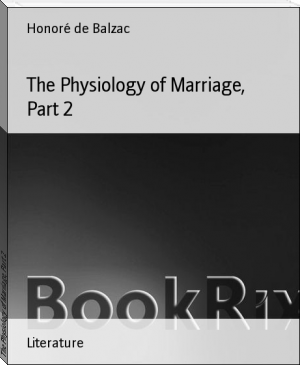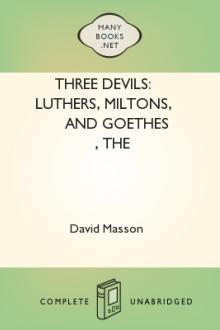The Physiology of Marriage, Part 3 - Honoré de Balzac (hardest books to read txt) 📗

- Author: Honoré de Balzac
Book online «The Physiology of Marriage, Part 3 - Honoré de Balzac (hardest books to read txt) 📗». Author Honoré de Balzac
Justice may be done to all these questions.
An ingenious author has recently put forth the view that men are much more modest than women. He supports this contention by a great mass of surgical experiences; but, in order that his conclusions merit our attention, it would be necessary that for a certain time men were subjected to treatment by women surgeons.
The opinion of Diderot is of still less weight.
To deny the existence of modesty, because it disappears during those crises in which almost all human sentiments are annihilated, is as unreasonable as to deny that life exists because death sooner or later comes.
Let us grant, then, that one sex has as much modesty as the other, and let us inquire in what modesty consists.
Rousseau makes modesty the outcome of all those coquetries which females display before males. This opinion appears to us equally mistaken.
The writers of the eighteenth century have doubtless rendered immense services to society; but their philosophy, based as it is upon sensualism, has never penetrated any deeper than the human epidermis. They have only considered the exterior universe; and so they have retarded, for some time, the moral development of man and the progress of science which will always draw its first principles from the Gospel, principles hereafter to be best understood by the fervent disciples of the Son of Man.
The study of thought's mysteries, the discovery of those organs which belong to the human soul, the geometry of its forces, the phenomena of its active power, the appreciation of the faculty by which we seem to have an independent power of bodily movement, so as to transport ourselves whither we will and to see without the aid of bodily organs, --in a word the laws of thought's dynamic and those of its physical influence,--these things will fall to the lot of the next century, as their portion in the treasury of human sciences. And perhaps we, of the present time, are merely occupied in quarrying the enormous blocks which later on some mighty genius will employ in the building of a glorious edifice.
Thus the error of Rousseau is simply the error of his age. He explains modesty by the relations of different human beings to each other instead of explaining it by the moral relations of each one with himself. Modesty is no more susceptible of analysis than conscience; and this perhaps is another way of saying that modesty is the conscience of the body; for while conscience directs our sentiments and the least movement of our thoughts towards the good, modesty presides over external movements. The actions which clash with our interests and thus disobey the laws of conscience wound us more than any other; and if they are repeated call forth our hatred. It is the same with acts which violate modesty in their relations to love, which is nothing but the expression of our whole sensibility. If extreme modesty is one of the conditions on which the reality of marriage is based, as we have tried to prove [See _Conjugal Catechism, Meditation IV._], it is evident that immodesty will destroy it. But this position, which would require long deductions for the acceptance of the physiologist, women generally apply, as it were, mechanically; for society, which exaggerates everything for the benefit of the exterior man, develops this sentiment of women from childhood, and around it are grouped almost every other sentiment. Moreover, the moment that this boundless veil, which takes away the natural brutality from the least gesture, is dragged down, woman disappears. Heart, mind, love, grace, all are in ruins. In a situation where the virginal innocence of a daughter of Tahiti is most brilliant, the European becomes detestable. In this lies the last weapon which a wife seizes, in order to escape from the sentiment which her husband still fosters towards her. She is powerful because she had made herself loathsome; and this woman, who would count it as the greatest misfortune that her lover should be permitted to see the slightest mystery of her toilette, is delighted to exhibit herself to her husband in the most disadvantageous situation that can possibly be imagined.
It is by means of this rigorous system that she will try to banish you from the conjugal bed. Mrs. Shandy may be taken to mean us harm in bidding the father of Tristram wind up the clock; so long as your wife is not blamed for the pleasure she takes in interrupting you by the most imperative questions. Where there formerly was movement and life is now lethargy and death. An act of love becomes a transaction long discussed and almost, as it were, settled by notarial seal. But we have in another place shown that we never refuse to seize upon the comic element in a matrimonial crisis, although here we may be permitted to disdain the diversion which the muse of Verville and of Marshall have found in the treachery of feminine manoeuvres, the insulting audacity of their talk, amid the cold-blooded cynicism which they exhibit in certain situations. It is too sad to laugh at, and too funny to mourn over. When a woman resorts to such extreme measures, worlds at once separate her from her husband. Nevertheless, there are some women to whom Heaven has given the gift of being charming under all circumstances, who know how to put a certain witty and comic grace into these performances, and who have such smooth tongues, to use the expression of Sully, that they obtain forgiveness for their caprices and their mockeries, and never estrange the hearts of their husbands.
What soul is so robust, what man so violently in love as to persist in his passion, after ten years of marriage, in presence of a wife who loves him no longer, who gives him proofs of this every moment, who repulses him, who deliberately shows herself bitter, caustic, sickly and capricious, and who will abjure her vows of elegance and cleanliness, rather than not see her husband turn away from her; in presence of a wife who will stake the success of her schemes upon the horror caused by her indecency?
All this, my dear sir, is so much more horrible because--
XCII. LOVERS IGNORE MODESTY.
We have now arrived at the last infernal circle in the Divine Comedy of Marriage. We are at the very bottom of Hell. There is something inexpressibly terrible in the situation of a married woman at the moment when unlawful love turns her away from her duties as mother and wife. As Diderot has very well put it, "infidelity in a woman is like unbelief in a priest, the last extreme of human failure; for her it is the greatest of social crimes, since it implies in her every other crime besides, and indeed either a wife profanes her lawless love by continuing to belong to her husband, or she breaks all the ties which attach her to her family, by giving herself over altogether to her lover. She ought to choose between the two courses, for her sole possible excuse lies in the intensity of her love."
She lives then between the claims of two obligations. It is a dilemma; she will work either the unhappiness of her lover, if he is sincere in his passion, or that of her husband, if she is still beloved by him.
It is to this frightful dilemma of feminine life that all the strange inconsistencies of women's conduct is to be attributed. In this lies the origin of all their lies, all their perfidies; here is the secret of all their mysteries. It is something to make one shudder. Moreover, even as simply based upon cold-blooded calculations, the conduct of a woman who accepts the unhappiness which attends virtue and scorns the bliss which is bought by crime, is a hundred times more reasonable. Nevertheless, almost all women will risk suffering in the future and ages of anguish for the ecstasy of one half hour. If the human feeling of self-preservation, if the fear of death does not check them, how fruitless must be the laws which send them for two years to the Madelonnettes? O sublime infamy! And when one comes to think that he for whom these sacrifices are to be made is one of our brethren, a gentleman to whom we would not trust our fortune, if we had one, a man who buttons his coat just as all of us do, it is enough to make one burst into a roar of laughter so loud, that starting from the Luxembourg it would pass over the whole of Paris and startle an ass browsing in the pasture at Montmartre.
It will perhaps appear extraordinary that in speaking of marriage we have touched upon so many subjects; but marriage is not only the whole of human life, it is the whole of two human lives. Now just as the addition of a figure to the drawing of a lottery multiplies the chances a hundredfold, so one single life united to another life multiplies by a startling progression the risks of human life, which are in any case so manifold.
MEDITATION XXVII.
OF THE LAST SYMPTOMS.
The author of this book has met in the world so many people possessed by a fanatic passion for a knowledge of the mean time, for watches with a second hand, and for exactness in the details of their existence, that he has considered this Meditation too necessary for the tranquillity of a great number of husbands, to be omitted. It would have been cruel to leave men, who are possessed with the passion for learning the hour of the day, without a compass whereby to estimate the last variations in the matrimonial zodiac, and to calculate the precise moment when the sign of the Minotaur appears on the horizon. The knowledge of conjugal time would require a whole book for its exposition, so fine and delicate are the observations required by the task. The master admits that his extreme youth has not permitted him as yet to note and verify more than a few symptoms; but he feels a just pride, on his arrival at the end of his difficult enterprise, from the consciousness that he is leaving to his successors a new field of research; and that in a matter apparently so trite, not only was there much to be said, but also very many points are found remaining which may yet be brought into the clear light of observation. He therefore presents here without order or connection the rough outlines which he has so far been able to execute, in the hope that later he may have leisure to co-ordinate them and to arrange them in a complete system. If he has been so far kept back in the accomplishment of a task of supreme national importance, he believes, he may say, without incurring the charge of vanity, that he has here indicated the natural division of those symptoms. They are necessarily of two kinds: the unicorns and the bicorns. The unicorn Minotaur is the





Comments (0)